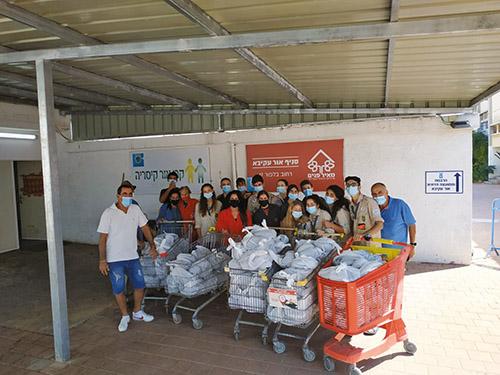




COVID-19 has altered all our lives irrevocably, but for the Meir Panim organization, which for 20 years has been feeding Israel’s hungry, it has upended operations, forcing them to come up with creative solutions. “We’d always received donations of fruit and vegetables, but all our cooked food came ready-made, rescued from event halls and hotels that were happy to send us their surplus at the end of the day. Today, with hotels and establishments closed, along with the shuttering of our own restaurant-style soup kitchens, we’ve had to start a whole new enterprise of cooking and packaging for delivery,” explains Mimi Rosmaryn, Meir Panim’s director of global development.
That means outfitting kitchens, purchasing raw materials and hiring cooks, without missing a beat—or a day’s worth of meals—for people who depend on it. And then there was the Meals on Wheels delivery service that needed to be greatly expanded.
If that doesn’t sound complicated enough, consider that since last March, Meir Panim has had to triple its output due to the lockdown and skyrocketing unemployment that suddenly thrust families beneath the poverty line.
Meir Panim’s patrons come from across the spectrum of Israeli society. In addition to the elderly, who can’t make ends meet on their pensions, Meir Panim caters to single-parent families, people on disability allowances as well as the working poor. “Many of our new patrons were breadwinners who, pre-COVID, had been getting by, living from paycheck to paycheck. However, being out of work after the first or second lockdown destroyed their safety net,” explains Mimi. “We’re there so that they don’t have to decide between buying groceries and paying the rent.”
Despite Israel’s growing food insecurity since COVID, Mimi and the managers of the Meir Panim branches in Jerusalem, Tiberias, Safed, Dimona and Or Akiva are gratified by the increase in volunteers among the general public.
Harvey Peretz is an acclaimed chef who had a successful career preparing gourmet cuisine at the upscale Dan hotel in Caesarea. When the corona crisis closed his hotel and left him without a job, Harvey didn’t hesitate and showed up at the Meir Panim kitchen in nearby Or Akiva. Like the other Meir Panim kitchens, the Or Akiva kitchen was equipped to refrigerate and warm up food, but not to cook whole meals. Harvey taught the staff all the logistics, including how to create a supply chain, how to order, and more. Harvey continued to work on a voluntary basis for several months, until recently when branch manager Ilanit found him a new job working for the local police department cafeteria.
Meir Panim also relies on its corps of dedicated volunteers to distribute the 2,000-3,000 meals that are prepared daily across Israel. “When people visit us and see the devotion and caring of our staff and managers, they get energized and are eager to support our work and take an active part in what we do,” says Mimi.
A prime example are Mrs. Miryam and Rabbi Dov Peretz Elkins, a couple from Princeton, New Jersey, who recently made aliyah. In honor of their wedding anniversary, their children sent them a check for them to give to the charity of their choice. The very day before the current lockdown, Miryam came to present the check together with the tin Meir Panim charity box they’d kept all these years in their New Jersey home. While the staff counted out the dimes, quarters and dollar bills, the couple watched, amazed and moved, by the dignity and care shown to patrons who came to pick up their meals.
Mimi Rozmaryn, originally from Manhattan, had been similarly impressed on her first visit to Meir Panim (so much so that she decided to apply for a job there!). “As a teen I used to volunteer at the local soup kitchen. When I came to Meir Panim I was shocked to see people, after finishing their meal, coming to the counter with plastic containers and filling them up to take home. That could never have happened in Manhattan, but at Meir Panim it was a matter of course. Today, too, our portions are usually generous enough to suffice for more than one meal.”
While feeding the hungry comes first, the organization has widened its view to the next generation in an effort to break the cycle of poverty. Meir Panim has initiated various social programs to rehabilitate at-risk youth, provide tools for a better future and promote social mobility. In the Gaza border town of Sderot, Meir Panim operates three neighborhood-based teen centers from 6 p.m. to 10 p.m., offering workshops, leadership development and pre-military counseling. In a community where 40% of young adults suffer from PTSD, programs like these have proved life-changing. During the lockdowns, the centers moved all activities outdoors so that programs could continue, ensuring the youth would be productively occupied.
In Dimona, a development town with rampant poverty and crime, Meir Panim’s tireless branch manager arranged for a grant from the Mandel Foundation. At the height of the corona crisis, Meir Panim overcame all odds and organized a 24-week intensive course for at-risk teens to build a career in the food industry. With courses including a chef-training program, the teens use their talents to benefit Meir Panim’s local branch, reinforcing the culture of giving back.
“These are just a few of the programs we have for different sectors,” says Mimi. “We have a lot more in the pipeline, but we’re limited by budgeting constraints. The more help we get, the more we’ll be able to do.”
Donations can be made online at www.mpdonate.org, through our toll-free number at (1877) 736-6283, or by mail to American Friends of Meir Panim at 88 Walton Street, Suite B1 Brooklyn, NY 11206-4479. All donations made in the U.S. are tax-deductible under EIN#
20-1582478.









